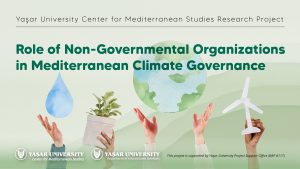Non-Governmental Organizations in the Mediterranean Climate Governance
Global governance is not producing transformation at the speed or scale that is needed to address climate change. In the absence of appropriate global response and national action plans, it is up to sub-state and non-state actors in general, civil (environment-climate) communities-networks in particular to harness the climate action. The Mediterranean is a climate change hotspot, and the region experiences fiercer environmental degradation than average. The purpose of this research is to explore and analyze discourses of climate change offered by selected regional intergovernmental and non-governmental organizations in the Mediterranean region through narrative analysis. What type of varying climate action plans do the regional organizations promote for the Mediterranean? What kind of narratives are used? The paper analyzes the framings of climate solutions through narrative analysis and categorizes them into three groups: brown capitalism (promotion of conventional growth and resolution of climate problem through technological innovation), green capitalism (promotion of innovative market tools for resolving climate change), eco-socialism (encouragement of decentralized, small-scale energy production and local sourcing of materials). Such an analysis will be critical since those climate narratives and solutions suggested partially explain the reasons behind the lack of an effective answer to climate change and could set the ground for more effective climate cooperation in the region.
This project is supported by Yaşar University Project Support Office (BAP #117)
Team
Coordinator: Prof. Emre İşeri
Researcher: Dr. Defne Gönenç
Consultant: Prof. Iosif Botetzagias
Research Assistants

